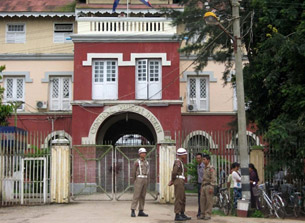Burma: Political prisoners freed
| Publisher | Radio Free Asia |
| Publication Date | 3 July 2012 |
| Cite as | Radio Free Asia, Burma: Political prisoners freed, 3 July 2012, available at: https://www.refworld.org/docid/500024fc1d.html [accessed 1 June 2023] |
| Disclaimer | This is not a UNHCR publication. UNHCR is not responsible for, nor does it necessarily endorse, its content. Any views expressed are solely those of the author or publisher and do not necessarily reflect those of UNHCR, the United Nations or its Member States. |
2012-07-03
Burma releases 20 more prisoners of conscience.
 Guards stand at the entrance to Insein Prison in Rangoon, Sept. 18, 2009. AFP
Guards stand at the entrance to Insein Prison in Rangoon, Sept. 18, 2009. AFP
Burma on Tuesday released a new batch of political prisoners imprisoned under its former military regime, as opposition leader Aung San Suu Kyi called for the release of remaining dissidents.
At least 20 political prisoners were among the 80 prisoners released on the orders of President Thein Sein, following a previous amnesty in January.
Activists who had been detained under the former military regime were freed from prisons across the country, including Insein, Kalay, Myin Gyan, Thayet, Katha, Pa-an, Tavoy, and Kawthaung.
Among the released was Thant Zaw, a former youth member of pro-democracy leader Aung San Suu Kyi's National League for Democracy (NLD) party while it was banned by the then-ruling military junta.
He said he had suffered torture during his 24 years in prison and felt that even being released was not much consolation after his ordeal.
"I'm not happy because with the reduced sentence I had already served most of my time. I was charged with something I did not do, and I was tortured and interrogated for so many years."
Another of those freed was former student activist Aye Aung, who had served out nearly 14 years of his 59-year sentence under illegal printing charges.
He said he had hoped for the release after authorities had started investigating his fellow political prisoners in the past month.
"On June 20, authorities asked me, 'How many prisoners are there like you?' and I told them that there are 68 of them. I also gave a list of 20 people whose names I remembered," he said after leaving Kalay Prison.
"Since then I had a feeling that I would be released soon, because I heard that all my friends were campaigning and demanding my release."
Of the 80 prisoners released under the presidential decree Tuesday, 34 were foreigners who will be deported, state media said.
The foreigners are believed to be from neighboring Bangladesh, with which relations have been strained since ethnic violence broke out in western Burma's Rakhine state last month involving ethnic Rohingyas, a stateless group that Burmese consider outsiders from across the border.
Call for further amnesties
Opposition leader Aung San Suu Kyi said there were over 300 more political prisoners waiting to be released, according to the NLD's count.
"We have asked the government to release all political prisoners. As far as our list goes, there are still 330 political prisoners remaining. Now, I ask for all 330 political prisoners to be released," she told reporters at a press conference in Rangoon.
Aung San Suu Kyi had called for further political prisoner releases during her Nobel Peace Prize reception ceremony in Norway last month, warning of the risk that "the unknown ones will be forgotten."
Burma has released more than 650 political prisoners since President Thein Sein's nominally civilian government came to power in March last year.
Foreign governments and rights groups had made their freedom a key condition for the lifting of sanctions, which were largely scaled back after the prisoner amnesty granted earlier this year.
'Burma' and 'Myanmar'
At the same press conference, Aung San Suu Kyi, who returned from a landmark European tour over the weekend, defended her use of the name "Burma" to refer to her country in English.
The country's election commission warned her last week to use the military junta-picked term 'Myanmar,' accusing her of flouting the constitution by using the name 'Burma' on her overseas trips.
"In a democratic nation, things should be done after viewing the desire of the people," Aung San Suu Kyi said, adding the army had renamed the country without consultation.
"So I assume that I can use whatever I want to use as I believe in democracy."
The government contends that the name Myanmar is more inclusive of the country's ethnic groups, not just the Burman majority.
Reported by RFA's Burmese service. Translated by Win Naing. Written in English by Rachel Vandenbrink.
Link to original story on RFA website
